 |
 |
 |
 |
 |
 |
 |
 |
 |
First Division - Anfield - 53,750
Scorers: None
Liverpool: Lawrence, Lawler, Strong, Smith, Yeats, Hughes, Callaghan, Graham, Evans, St John, Thompson
Leeds United: Sprake, Reaney, Cooper, Bremner, Charlton, Hunter, O'Grady, Madeley, Jones, Giles, Gray
The match had originally been scheduled for 22 March, but a twist
of fate saw to it that the top two sides would face each other
at Anfield as the season reached its final knockings. The original
fixture was postponed because of a flu epidemic at Elland Road.
Eight first team players were laid low, while two others were
out injured. The Football League agreed to a request made by United
assistant manager Maurice Lindley as Leeds flew home after losing
to Ujpest Dozsa in the Fairs Cup. The decision was a controversial one; particularly as United had also
previously been given leave to bring forward some of their Easter fixtures.
Liverpool were furious at the decision, with hinted accusations of conspiracy,
though in public Reds manager Bill Shankly would only mutter tersely,
'This is terrible … a great disappointment.' At the original time of the fixture, Liverpool lagged six points
behind United with a game in hand, and their title challenge was
being frustrated by the weather. They had played just once since
22 February, winning 2-0 at Sunderland. Being forced to kick their
heels for the best part of a month while Leeds were winning three
straight games, against Nottingham Forest, Southampton and Stoke
City, handed the momentum to the Whites. By the time the rearranged fixture came around, Leeds' lead was
five points. United had only Liverpool and Nottingham Forest to
face, while the Reds had three games left. The title rivals each played out goalless draws away from home
on 22 April, United defying third-placed Everton at Goodison while
Liverpool surprisingly dropped a point at relegation-threatened
Coventry. Those results left the advantage with Leeds. Both teams sat out the following Saturday, FA Cup final day;
the waiting was easier for United than it was for Liverpool. The
equation was simple: if Leeds drew or won at Anfield, the League
championship was theirs; if Liverpool were victorious, then United
could still secure the title by beating Forest at home two days
later. However, manager Don Revie had suffered too many disappointments
in previous seasons to take anything for granted. He refused to
count any chickens until the necessary points were in the bag. Phil Brown wrote in the Yorkshire Evening Post on the day of the
game: 'The side is buoyant 'But United are never more determined than when facing odds - the side's
tenacity of purpose is unbreakable, which is just as well. Liverpool at
Anfield are hardly the side you would choose to have to play for all the
League title means. The Anfield Kop is nearly worth a home goal to start
with.' Leeds went into the game in marginally the better form - they
were undefeated in the League since losing
5-1 at Burnley in October, and had conceded just 2 goals in
the previous 7 games. Liverpool themselves had not lost since
15 February, when struggling Nottingham Forest had surprisingly
won 2-0 at Anfield, but they had drawn too many games. The points
difference between the two had remained stubbornly at four or
more for eight weeks. Don Revie was able to select from strength; his only change from
the draw at Everton was to recall the fit again Mick Jones at
centre-forward, with Peter Lorimer dropping to the bench. Liverpool were unchanged, though this meant they would continue without
World Cup winner Roger Hunt, who had not played since dislocating a collar
bone at Stoke on Easter Monday. This was two days after he scored his
three hundredth goal for the Reds. Alun Evans, who became Britain's first
£100,000 teenager when he arrived from Wolves earlier in the season, would
continue to lead the attack. This was despite his dismissal the week before
along with Coventry centre-half Maurice Setters for Don Revie hinted before the game that United would attack whenever
they had the chance. Few who had seen them play over the previous
five years gave much credence to those claims and it was clear
from the off that Leeds would be content with a clean sheet. There were 53,750 passionate football followers in the stadium,
but hundreds more were locked outside when the gates were closed
five minutes before the off. Billy Bremner won the toss and chose to make Liverpool play towards the
Kop in the first half. It was a calculated risk, leaving Leeds to weather
a fearsome opening burst. As Bremner later told Phil Brown of the Yorkshire
Evening Post, 'The team was unusually nervous when it went out. I
have never known them like they were tonight. It was worse than our FA
Cup final. I was nervous. I couldn't sleep the night before, and that
isn't me. I even got up out of bed at four o'clock in the morning and
smoked a cigarette to try and stop thinking about the game. There was
such a lot at stake, of course, and it nearly beat us.' Sure enough, the opening was frenetic, described as 'Liverpool's nearly
wolf like first 15 minutes' by Phil Brown. At first, United could not
hide their anxiety, rushing everything they did and making some rash challenges.
Liverpool were just as wound up by the occasion, and there were some fierce
opening exchanges. United committed two fouls in five minutes and Liverpool
retorted with four in five, all six driven by nerves. In that period Tommy
Smith, Tommy Lawrence, Terry Cooper, Gary Sprake and Mick Jones all required
treatment after ferocious clashes, provoking even fiercer reactions from
a passionate crowd. But after the initial storm started to subside a little, Leeds established
a calm rhythm and shape that Liverpool found difficult to fathom, let
alone pierce. The Reds were too keyed up to take a considered approach
and continually tried to force the pace. Cooler heads might have made
them more effective, but they were all set on overpowering the champions
elect. United, in contrast, kept their cool and stuck rigidly to Don Revie's
blueprint for the game. Rob Bagchi and Paul Rogerson in The Unforgiven: 'Madeley dropped
deep to help out his beleaguered colleagues at every opportunity, frustrating
Liverpool's forwards with a grim display of organised obduracy. Reaney
and Cooper had been detailed to sit tight on Callaghan and Thompson, Liverpool's
two wingers, forcing the main thrusts to go through the middle where there
were massed ranks of white shirts.' Jack
Charlton's aerial dominance, the assured tackling and covering of
Norman Hunter and a faultless performance by Gary Sprake made the United
spine a particularly tough one to best. In front of the rearguard, United had O'Grady,
Bremner, Giles and Gray splayed across midfield to deny the Reds space,
with Mick Jones defending from the front. It was an approach that had worked for Leeds hundreds of times before
- they were past masters at the art of smothering, blanket defence, having
perfected the game during Despite sustained Liverpool pressure, there were few early moments of
real anxiety apart from once when Madeley had to hurriedly head away with
goalkeeper Sprake caught out of position. United responded with a deflected
shot from Bremner which almost beat the scrambling Lawrence. It was 26 minutes before an attempt at goal worthy of the name. Callaghan
fired wide with an ambitious 25-yard effort, but the chance marked the
start of a second wind for Liverpool. They pressed hard and came close
to breaking the deadlock in the 35th minute. Bobby Graham for once evaded United's all consuming defensive net to
get in a cross for Alun Evans, 14 yards out. In his eagerness the young
striker snatched at the chance and fired it high and wide. Derek Wallis in the Mirror: 'Liverpool needed that goal, because
the pattern of the first half indicated they might not get many more chances.
There was little sign of the attacking play that Leeds manager Don Revie
had promised, but neither was there much hint that Liverpool might improve
on first half methods that carried more power than imagination.' There were few other chances in the first half and when the break came
the job was half done. United had weathered the initial storm and done
so with some assurance, despite all the pressure. Leeds' confidence was boosted by achieving their first milestone, but
Bill Shankly had got into his men's ribs during the break and urged them
to raise themselves for one final 45 minutes of all out assault. The Reds
had struggled to make clear opportunities in the first half, but now they
managed to find some chinks in the iron curtain that faced them. After sixty-one minutes, Sprake had to pull out all the stops to deny
Callaghan. The Liverpool wing man hammered the ball goalwards only for
the keeper to fling himself into a deft save to his right. Liverpool came close to a breakthrough in the 72nd minute. The canny
Ian St John manufactured an opening with a clever lob into the penalty
area that found Evans unmarked. Again, the teenager failed to provide
the finish, shooting wide with the goal at his mercy. That was as close as the Reds came and United were able to fashion some
chances of their own over the last fifteen minutes, even for a few fleeting
moments looking the better side. For most of the game they had left Jones
an isolated figure up front, but towards the end they managed to get some
reinforcements forward. On one occasion Giles nearly sent O'Grady clear,
though the chance came to nothing. There was the inevitable pounding all round the United area over the
frantic final minutes, but Liverpool simply did not have the inspiration
to unlock the tightest of rearguards - the game was up and United had
survived in magnificent fashion. Geoffrey Green commented in The Times: 'Once Callaghan drew Sprake
full length, like a piece of elastic, to turn away a rising shot. But
that is the Leeds way. That is how they survive. They are used to following
in the line of sternest resistance. For most of the night 'Also ready to come through powerfully was Smith, breaking from the rear.
But such was the magnificent covering of this Leeds defence, marshalled
by Charlton, Bremner, Hunter and Madeley in midfield, that Liverpool were
forced more and more to make their moves crossfield, and even backwards,
as they searched for the lines of approach through and behind them. It
was a night when the red waves of the Liverpool attack crashed in vain
against the tall, white cliff of this defence. Here were two sides, hard
as a diamond, but without the brilliant flame of that stone. No one would
expect the refinements in such a battle. 'Instead, we saw modern techniques in opposition, with Leeds applying
the straitjacket on their opponents inside the penalty area. Some may
say all this was alienated from the frills of football. It was. It was
an occasion for men, not boys.' Eric Todd in The Guardian: 'As one who has followed Leeds - worshipped
as a schoolboy - for many years since the days of Edwards,
Hart and Copping, I naturally was
highly gratified by the evening's performance, but never in all the intervening
years have I seen any side subjected to such remorseless, pitiless pressure
as were Leeds this night. Time after time it seemed that Leeds must crack.
And time after time Liverpool were driven back by a defence which has
been the despair of so many teams in this country. Bremner, as usual,
played a captain's part and he was encompassed on every side by strong
and versatile colleagues. The Leeds forwards naturally had few chances,
but they made several good looking attacks as if to convince Liverpool
and themselves that they had not come either just for the ride or just
for a point. 'Liverpool had every reason to be frustrated and nobody more so than
Smith, who in attack and defence was nothing short of great. St John,
too, was a tremendous worker in midfield and he, in his turn, had reason
to feel aggrieved when his passes were put to poor use. Against an ordinary
side Liverpool probably would have won. But then Leeds are not an ordinary
side!' Phil Brown: 'The Kop had not seen any sort of a five star game. The defences
were right on top after half an hour or so, while the sides were sounding
each other out, and combined football and individual effort crashed in
vain on the rocks of two superb modern defensive systems studded with
internationals. 'Sprake and his Scottish international opposite, Lawrence, were really
bothered only at corners, and both were brilliant with the flag kicks,
even with two towering and dominant centre-halves, Charlton and Yeats,
coming up for them. 'Such was the mutual zest and speed of the marking, chasing and challenging
that even if two good passes were made, the third was wrecked, and the
quality of the football was not improved when both teams resorted to long
but none too accurate high balls. These only showed the splendid heading
skills in both defences, but it was exciting enough with every forward
of the 10 chasing.' Billy Bremner: 'The match was a bit of a let-down. I couldn't see Leeds
scoring, but didn't think Liverpool would do so either … 'Liverpool's midfield players couldn't build up anything as the ball
was being repeatedly hit backwards and forwards over their heads. The
more the game went on, the more I was convinced Leeds wouldn't lose.' Bagchi and Rogerson: 'What happened next has become part of Leeds United
folklore. Beforehand, Revie had instructed Bremner, if they should get
that decisive point, to lead the players after the game towards the Kop.
Bremner took some persuading, but after they had celebrated before their
own travelling support, Bremner duly marched his men forward. The ground
fell silent, but instead of being lynched, the Leeds team were surprised
to find themselves being loudly hailed as champions by the 27,000 Koppites
massed in front of them. The players stayed put for 20 minutes, soaking
it all in, larking around, jumping on one another and paying their tributes
to both sets of fans. They had been derided and despised for such a long
time that one could not blame them for basking in the adulation. "Being
cheered by a rival crowd - any rival crowd - was a new experience for
us," Eddie Gray recalls. "This in itself was as much of a turning
point for Leeds as the championship achievement." 'Back in the dressing room, where Shankly had provided a crate of champagne,
Revie clearly felt flattered by the two extraordinary events of the evening:
"The reception given us by the sporting Liverpool crowd was truly
magnificent," he said, "and so, for that matter, was our defence
tonight. It was superb in everything." 'Shankly, an incurable romantic where football was concerned and not
one to bandy around accolades where they were not deserved, gave Leeds
his stamp of approval. "Leeds United are worthy champions,"
he proclaimed. "They are a great side." That was good enough
for Revie and his team. The respect of their fellow professionals was
all they craved and now they revelled in the novel experience of popularity.
They were underdogs no more. A psychological weight had been lifted. "That
wonderful night at Anfield saw our burning faith in ourselves justified,"
Billy Bremner reflected. "At last we were well and truly vindicated."
The irksome oiks, Revie's "Little West Riding Hoods", had joined
football's aristocracy.' 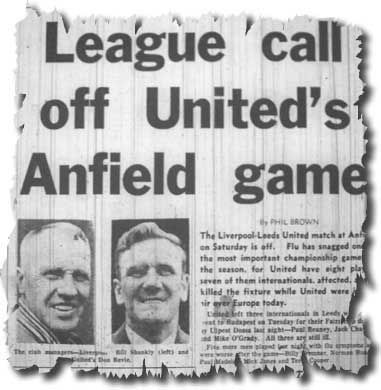 April
1969 … Don Revie had spent eight
eventful years building Leeds United into a team that could challenge
for the game's highest honours … now the moment of truth was upon them
as they faced Liverpool in a league championship showdown which would
decide the destination of the trophy.
April
1969 … Don Revie had spent eight
eventful years building Leeds United into a team that could challenge
for the game's highest honours … now the moment of truth was upon them
as they faced Liverpool in a league championship showdown which would
decide the destination of the trophy.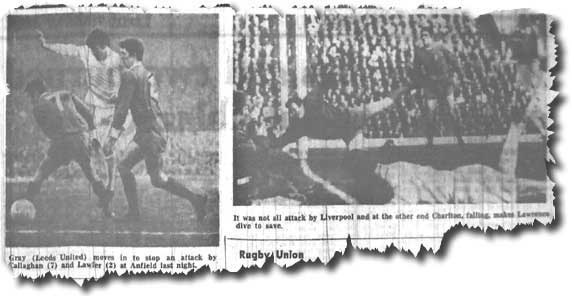 with hope and the right sort of confidence
as it rests this afternoon in its Liverpool hotel, and the manager is
of the same mood too, I fancy, although all Don Revie will say in the
last words style is, "We have a chance, and I hope we can take it."
with hope and the right sort of confidence
as it rests this afternoon in its Liverpool hotel, and the manager is
of the same mood too, I fancy, although all Don Revie will say in the
last words style is, "We have a chance, and I hope we can take it."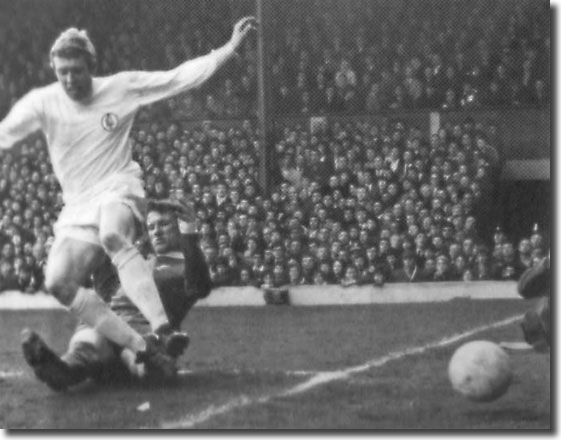 fighting.
fighting.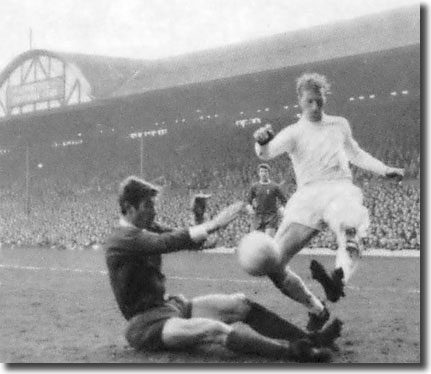 their regular European forays.
their regular European forays.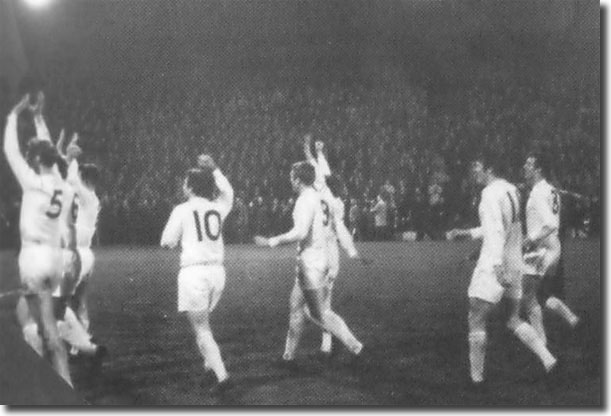 Liverpool had
a thumbscrew on them as Hughes, St John, Thompson, Callaghan, Graham and
the rest built up their pounding attacks.
Liverpool had
a thumbscrew on them as Hughes, St John, Thompson, Callaghan, Graham and
the rest built up their pounding attacks.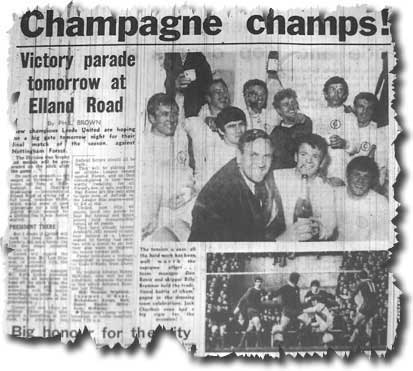 generally it
was one of those frustrating games where the ball keeps running out of
play every minute. After failing to get an early goal, Liverpool became
over-anxious and made the mistake of hitting too many high crosses into
our goal-mouth ... Gary and Big Jack had no trouble gobbling these up.
generally it
was one of those frustrating games where the ball keeps running out of
play every minute. After failing to get an early goal, Liverpool became
over-anxious and made the mistake of hitting too many high crosses into
our goal-mouth ... Gary and Big Jack had no trouble gobbling these up.